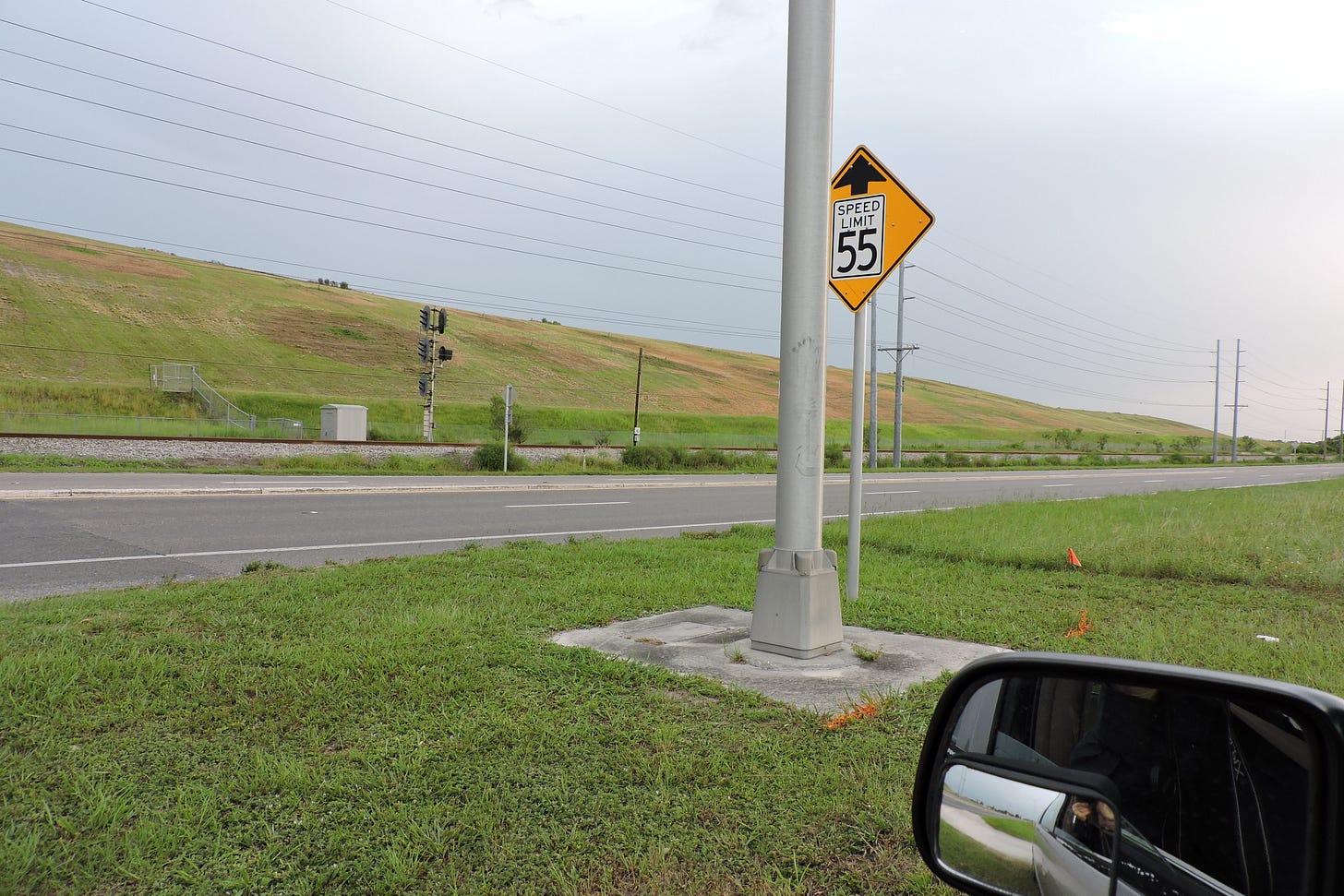Florida lawmakers try to solve a toxic waste problem — and help an industrial giant
The Trade Show (2023 ed.), Vol. 14

This is “The Trade Show,” a weekly collection of shorter news nuggets and stories from other outlets around the state and country about the special interest-driven issues that lawmakers spend most of their time working on. The name comes from something a mentor once told me before I covered my very first session of the Florida Legislature more than 20 years ago: “Ninety percent of what goes on up here is a trade show.” As always, our content here at Seeking Rents is free to all readers. But please consider a paid subscription to support our work, if you can afford one
Last week, just after lawmakers in the state House and Senate began negotiating a final state budget for next year, the Senate put a big new earmark on the table: $20 million to create a “Center for Rare Earths, Critical Minerals and Industrial Byproducts” at Florida State University.
The project has a space-age name. But its purpose, at least in part, is to solve an old problem: What to do with 1 billion tons of toxic waste that is just sitting around the state right now — thanks to Florida’s phosphate industry.
That waste is known as phosphogypsum, and it’s a byproduct of the chemical manufacturing process that turns phosphate rock into fertilizer. Federal environmental regulations restrict the use of phosphogypsum, which is mildly radioactive. So, for decade now, the phosphate industry has been piling it all up into manmade mountains known as gypstacks.
Those stacks grow by about 30 million tons of phosphate each year — most of it produced by the Mosaic Co., the mining and manufacturing giant that turned a $3.6 billion profit last year and is now the dominant phosphate producer in Florida.

Finding something to do with all that piled-up phosphogypsum is important for the future of the company, which owns about two-thirds of the state’s gypstacks. Each stack is both an economic liability, vulnerable to sinkholes and breaches, and an economic opportunity, as there are other countries, like Brazil, where Mosaic sells phosphogypsum for other uses.
And that’s where the new FSU Center for Rare Earths, Critical Minerals and Industrial Byproducts comes into play.
Researchers have identified phosphogypsum as a potential source of rare earth minerals — a group of metals used in consumer electronics and other industries. The $20 million for the FSU Center, which the state House agreed to fund on Saturday evening, would support further research at FSU aimed at extracting those minerals from phosphogypsum, as well as removing the radioactivity so the remaining material can be reused for something else.
There’s also another $150,000 for the center tucked into another line item in the budget. And lawmakers want the center to prepare a report by June 30 of next year that could include recommend legislation to support a new gypstack-to-cell-phone pipeline.
“We’re looking at ways…to take a pollution product and make it into viable building products and other things,” Sen. Keith Perry, a Gainesville Republican who has been involved with university budget negotiations, told reporters last week.
Radioactive roads
Phosphate waste has quietly been a big issue this session.
In addition to committing millions of dollars to research, lawmakers are also expected to pass a bill next week ordering the Florida Department of Transportation to study the use of phosphogypsum in road construction.
The legislation (House Bill 1191 and Senate Bill 1258) would also allow the agency to test the waste material in demonstration projects.
Environmentalists have fought the bills, warning that they could expose construction workers to dangerous levels of radiation — and the state to an environmental catastrophe, should a road built with phosphogypsum wash out during a hurricane or other heavy storm.
But Mosaic, long one of the most influential industrial businesses in Florida, has lobbied hard for the bills, and they have breezed along with relatively little opposition from lawmakers.
Mosaic is a major donor. Records show the company has made more than $400,000 worth of campaign contributions since November — including $200,000 to the Republican Party of Florida; $100,000 to a committee controlled by Senate President Kathleen Passidomo (R-Naples); $50,000 to a committee controlled by House Speaker Paul Renner (R-Palm Coast); and $25,000 to Gov. Ron DeSantis.
Toxic waste tech
There’s more money in the budget for Florida’s phosphogypsum problem, too.
The House and Senate have also agreed to give $950,000 to Novaphos Corp., a private company that says it has developed technology to reprocess phosphogypsum into two reusable products: Sulfur gases, which can then be used in other industrial manufacturing, and a calcium silicate product called “J-Rox,” which the company says can be used in construction and agriculture.
Novaphos is also a campaign contributor, though not nearly at the level of Mosaic. Records show the Polk County-based company gave $21,500 in political donations just as the session began, spreading the money among a handful of key legislators and the Republican Party of Florida.
A gentle ‘crackdown’
After Gov. Ron DeSantis and the Florida Legislature gave the property insurance industry nearly everything it ever dreamed of during a special session in December, they’ve been working on bills this session to crack down on insurance companies that don’t actually take care of their customers.
But these “accountability” measures seem to be getting weaker by the day.
Read: Amid Florida insurance crisis, lawmakers drop idea to investigate profits (Tampa Bay Times)
Taking rights away from renters
Last week was a rough one for renters in Florida.
Egged on by the Florida Apartment Association and other real-estate industry lobbying groups, lawmakers passed a sweeping bill that will undo dozens of local laws around the state that help protect renters.
The far-reaching bill (House Bill 1417) will dissolve “Tenant’s Bill of Rights” ordinances and similar local laws, which provided basic consumer protections like requiring landlords to give more notice before they raise the rent or ensuring a prospective renter isn’t discriminated against based on their source of income.
That’s not all. Lawmakers also approved a vendor-driven bill (House Bill 133) ensuring landlords can charge perpetual, uncapped and non-refundable fees instead of upfront and refundable security deposits.
Read: Renters may pay monthly fees, and state will override local tenant rights in bills headed to DeSantis (WUSF)
Read: Florida House moves to eliminate local renters’ rights ordinances (Tampa Bay Times)
The biggest lie of the legislative session
The biggest lie of this year’s legislative session may have come from supporters of a big union-busting bill, who claimed they were trying to help public-sector workers like teachers, 911 dispatchers and sanitation crews — all while making sure that none of their “help” applied to police officers, firefighters or prison guards.
This bill (Senate Bill 256), which is designed to defund and decertify unions representing public-sector employees, is so anti-worker that 14 Republican legislators in the GOP-controlled Legislature voted against it.
That included five in the Senate, where the bill passed 23-17 last month, and nine more in the state House, where it passed 72-44 last week.
Know who’s happy about this? The Florida Chamber of Commerce.
Read: Florida unions face strict restrictions — unless they tend to ally with Republicans (Palm Beach Post)
A final fight to watch
One of the bills to watch during the final week of session is House Bill 917.
This particular piece of legislation began as an effort by Major League Baseball to screw minor league players out of the minimum wage. But it was rewritten late in the process to screw tens of thousands of other workers out of a living wage, too.
The battleground appears to be in the Florida Senate. Senators have so far refused to add the measure that undoes local living wage laws to its version of the bill letting Major League Baseball pay a sub-minimum wage (Senate Bill 892).
The 60-day session should end Friday.
Read: Thousands could have paychecks cut under Florida House plan (Tampa Bay Times)





Yeah, well - let's not forget that the goal of dictators is not to help the people - or the environment that sustains them.
All in the name of Authoritarianism. The agenda is one of power which corrupts the truth and destroys the future at the expense of anyone who questions or stands in the way of their insatiable greed.
"DeSantis’s agenda in Florida is evidence that the Republican shift in this direction is continuing, maybe even accelerating. He has shown little interest in moderation or consensus-building instead centering his governing philosophy on using policy to own the libs. While Trump may have been an ideological catalyst for the GOP’s authoritarian lurch, DeSantis is showing how it could actually be implemented in practice. The consequences for democracy in Florida, and America in general, could be dire."
-----------
"In such an existential struggle, the old norms of tolerance and limited government need to be adjusted, tailored to a world where the left controls the commanding heights of culture. Since the left can’t be beaten in that realm, government must be seized and wielded in service of a right-wing cultural agenda."
https://www.vox.com/policy-and-politics/2022/4/28/23037788/ron-desantis-florida-viktor-orban-hungary-right-authoritarian
Please stop using lobby in place of bribe